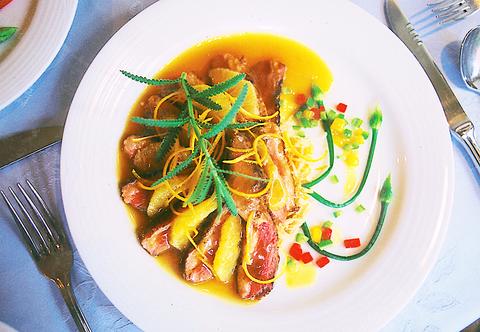Having dined unannounced at L'escargots, I could believe it when a waitress told me that ingredients for the NT$480 business lunch would cost the restaurant as much as NT$300. Now open for about two years, the restaurant defies the norms of Taipei gourmet dining by offering unreasonably reasonable prices for unreasonably delicious food. Currently the most expensive dinner set, lobster thermidor, costs only NT$780. At the other end of the menu, the range begins with stuffed pike in white wine sauce for NT$530. Anything you eat will be marvelous, and if that were not enough, the waitstaff provides knowledgeable and impeccable service, the tables are far enough apart, and the atmosphere is friendly and local -- a happy alternative to the aloof, five-star environments that usually signify Taipei gourmet. All told, there's so much right with this restaurant, it's hard to note any flaws.
L'escargots' head chef, Yeh Yeong-ming (
To keep the menu fresh and in season, Yeh brings in almost completely new menus once every three to four months. The business lunch set, meanwhile, changes weekly.

PHOTO: DAVID FRAZIER, TAIPEI TIMES
Six-course dinner sets include a choice of five appetizers, soup, salad, main course, dessert and coffee or tea. The pacing and proportions of the various courses are so perfect it's almost magical. Needless to say, he's trained his staff quite well -- to the point, in fact, that they will probably know better than you which wines from the cellar will go with your meal. It's a welcome change from more standard and stand-offish fine dining, where black-tied waiters snatch plates the moment the fork has been implanted into a dish's final morsel -- in effect rushing you out of the restaurant. At L'escargots, courses ebb and flow naturally, as if the wait staff could read your mind, or at least your appetite.
One of the only dishes that never changes is the restaurant's namesake, escargots bourguignon, a truly delicious dish that no one should pass up. Yeh makes it by first sauteing the shelled snails in garlic and spices, then simmering them in beef broth for at least two hours, making them tender and fully impregnated with the broth. Afterwards they are baked underneath a batter of butter, egg and garlic, which seals in their extraordinary flavor. Yeh says that the recipe is French, but has been adjusted to tone down some of the stronger flavors. I would say it's its own unique brand of perfection.

On April 26, The Lancet published a letter from two doctors at Taichung-based China Medical University Hospital (CMUH) warning that “Taiwan’s Health Care System is on the Brink of Collapse.” The authors said that “Years of policy inaction and mismanagement of resources have led to the National Health Insurance system operating under unsustainable conditions.” The pushback was immediate. Errors in the paper were quickly identified and publicized, to discredit the authors (the hospital apologized). CNA reported that CMUH said the letter described Taiwan in 2021 as having 62 nurses per 10,000 people, when the correct number was 78 nurses per 10,000

As we live longer, our risk of cognitive impairment is increasing. How can we delay the onset of symptoms? Do we have to give up every indulgence or can small changes make a difference? We asked neurologists for tips on how to keep our brains healthy for life. TAKE CARE OF YOUR HEALTH “All of the sensible things that apply to bodily health apply to brain health,” says Suzanne O’Sullivan, a consultant in neurology at the National Hospital for Neurology and Neurosurgery in London, and the author of The Age of Diagnosis. “When you’re 20, you can get away with absolute

May 5 to May 11 What started out as friction between Taiwanese students at Taichung First High School and a Japanese head cook escalated dramatically over the first two weeks of May 1927. It began on April 30 when the cook’s wife knew that lotus starch used in that night’s dinner had rat feces in it, but failed to inform staff until the meal was already prepared. The students believed that her silence was intentional, and filed a complaint. The school’s Japanese administrators sided with the cook’s family, dismissing the students as troublemakers and clamping down on their freedoms — with

As Donald Trump’s executive order in March led to the shuttering of Voice of America (VOA) — the global broadcaster whose roots date back to the fight against Nazi propaganda — he quickly attracted support from figures not used to aligning themselves with any US administration. Trump had ordered the US Agency for Global Media, the federal agency that funds VOA and other groups promoting independent journalism overseas, to be “eliminated to the maximum extent consistent with applicable law.” The decision suddenly halted programming in 49 languages to more than 425 million people. In Moscow, Margarita Simonyan, the hardline editor-in-chief of the